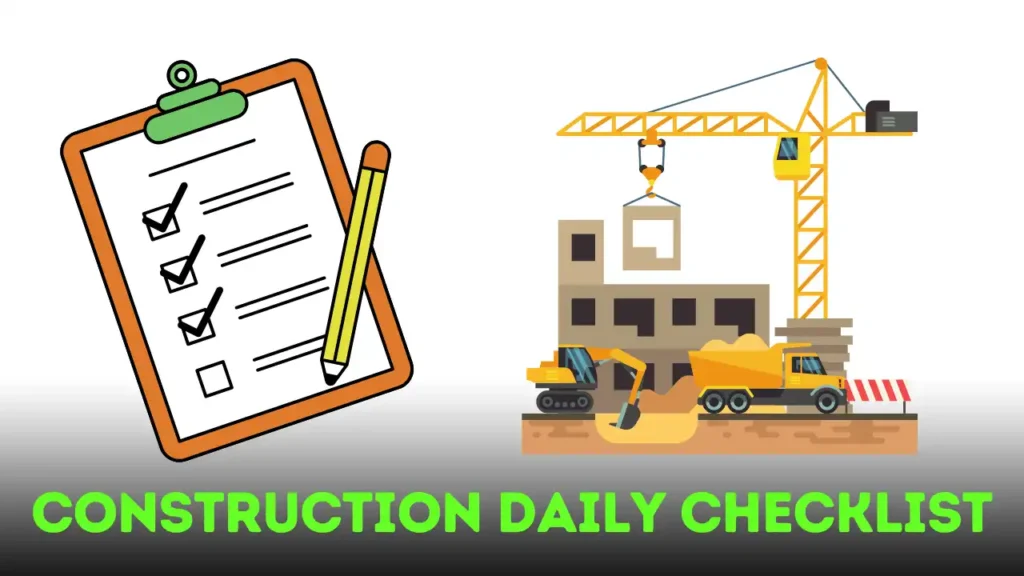Table of Contents
Construction sites are bustling hubs of activity, where precision, safety, and efficiency are paramount. For civil engineers and supervisors, managing the intricate daily operations can be a monumental task. This is where a comprehensive construction site daily checklist becomes an absolute game-changer.
More than just a formality, a daily checklist is a powerful tool that ensures every critical detail is accounted for, keeping your project on track, on budget, and most importantly, safe.
Why a Daily Checklist is Your Best Ally in Construction Project Management
Imagine overlooking a crucial step in foundation work or missing a vital safety check. The consequences could range from costly rework to severe accidents. A well-structured checklist prevents these pitfalls by:
- Enhancing Safety & Compliance: Ensuring all safety protocols, from PPE usage to equipment checks, are consistently met, reducing workplace hazards and meeting regulatory requirements.
- Guaranteeing Quality Control: Verifying materials, dimensions, and workmanship against project specifications, minimizing defects and ensuring structural integrity.
- Boosting Progress & Efficiency: Systematically tracking completed tasks allows for accurate progress monitoring, identifies bottlenecks, and streamlines workflows.
- Optimizing Resource Management: Keeping tabs on manpower, equipment, and material consumption helps in better planning and allocation of resources.
- Mitigating Risks: Proactively identifying and addressing potential issues before they escalate into major problems.
🏗️ Construction Site Daily Checklist
Unpacking a Comprehensive Construction Site Daily Checklist
What should a robust checklist encompass? Our ideal checklist, designed for civil engineers and site supervisors, breaks down the complexities of a construction project into manageable, actionable items across various critical stages:

- Site Mobilization & Preparation: From site clearance and temporary facilities setup to security fencing and permit verification.
- Earthwork & Excavation: Covering layout marking, shoring, subgrade compaction, and underground utility protection.
- Foundation Work: Detailed checks for rebar placement, formwork, concrete pouring, and curing for footings, piles, and rafts.
- Structural Work (RCC): Ensuring precision in shuttering, reinforcement, concrete pouring, and post-pouring checks for columns, beams, slabs, and walls.
- Masonry & Block Work: Verifying brick/block quality, mortar mix, joint finishing, and embedding of conduits.
- Waterproofing & Damp-proofing: Crucial steps like surface preparation, membrane application, joint sealing, and water ponding tests.
- Plumbing Rough-in & Drainage: Checks for piping materials, layout, slope, and leakage tests for water supply and drainage lines.
- Electrical Rough-in & Conduiting: Ensuring correct conduit routing, box placement, earthing, and circuit segregation.
- MEP Final Fixes (Electrical, Plumbing, HVAC, Fire): Comprehensive testing and commissioning of all mechanical, electrical, and plumbing systems, including final fixture installation.
- Finishing Work: From plastering and painting to flooring, tiling, door/window installation, and false ceilings.
- External Development & Landscaping: Covering roads, pavements, drainage, stormwater management, and planting.
- Procurement & Material Management: Essential checks for material delivery, storage, inventory, and waste disposal.
- Equipment & Plant Management: Daily checks for equipment health, maintenance schedules, and operator competency.
- Environmental Management: Ensuring dust control, noise pollution mitigation, waste segregation, and compliance with environmental regulations.
- Pre-commissioning & Commissioning: Detailed functional, leak, and performance testing of all installed systems.
- Safety & Compliance (Daily/Weekly): Ongoing verification of PPE usage, site barricades, first aid, fire safety, and toolbox talks.
- Quality Control & Inspection (Ongoing): Regular material quality checks, dimension verification, concrete testing, and defect logging.
- Daily Site Management & Reporting: Crucial for tracking weather, manpower, equipment status, and overall progress, leading to daily progress reports (DPR).
- Project Closeout & Handover: Final site cleanup, defect rectification, as-built drawings, and warranty documentation.
- Miscellaneous: General site housekeeping and subcontractor coordination.
The Digital Advantage: Streamlining Your Checks
In today’s fast-paced construction world, relying solely on paper checklists can be cumbersome. Digital checklists, like the web application we’ve discussed, offer immense benefits:
- Easy Access: Available on any device, anywhere on the site.
- Instant Updates: Mark items complete with a tap, and save your progress instantly.
- Search & Filter: Quickly find specific tasks or categories.
- Customization: Add your own unique checklist items to adapt to specific project needs.
- Data Consistency: Standardizes checks across the team, ensuring nothing is missed.
Conclusion
Implementing a detailed, digital daily checklist is no longer a luxury but a necessity for successful construction project management. It empowers civil engineers and supervisors to maintain rigorous control over quality, safety, and progress, leading to better outcomes, reduced risks, and more efficient operations. Embrace this simple yet powerful tool to build better, smarter, and safer.
Great